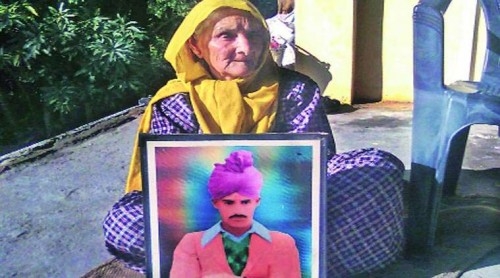
“Now I will die in peace,” said octogenarian Brahmi Devi, widow of an Indian soldier, Naik Kirpa Ram, whose posthumously-awarded George Cross bravery medal was “stolen” 13-year-ago from Himachal Pradesh and has now been retrieved by the British authorities.
The British High Commission in Delhi, which retrieved the medal from an auction house, will return it to the soldier’s widow, who was struggling to get the honour back, at a ceremony in her native village in Bilaspur district on Monday.
“For all these years I was fighting the battle to get the lost honour back. This is the last remembrance of my husband. Now, I will not lose it at any cost,” Brahmi Devi told IANS over the phone.
Brigadier Brian McCall, defence attache at the British High Commission, will return the George Cross to Brahmi Devi in a small public ceremony, a statement from the high commission said.
For Brahmi Devi, 80, who received the George Cross awarded to her martyred husband from the then viceroy, Field Marshal Lord Wavell, in 1946, the return of the medal is no less than celebrations.
Her husband Naik Kirpa Ram was awarded the George Cross, considered the civilian counterpart of Britain’s highest military decoration — the Victoria Cross — for sacrificing his life to save his comrades while disposing of a misfired rifle grenade at a camp in Bangalore on September 12, 1945.
But the medal was allegedly stolen from Devi’s house in 2002. After a prolonged legal battle, her counsel in Britain managed to get back the medal. However, the British government supported efforts to have the medal returned to her.
UK barrister Ian Mayes, who fought Brahmi Devi’s case ‘pro bono’ (without fee) will speak at the ceremony at Bhapral village.
British Deputy High Commissioner based in Chandigarh David Lelliott, Lok Sabha MP Anurag Thakur, village sarpanch Anita Thakur and local residents will also attend the ceremony.
Born in 1916, soldier Kirpa Ram volunteered to join the Indian Army and during the World War II, he became a member of the 8th Battalion, 13th Frontier Force Rifles.
He was deployed for the Burma campaign and on his return to India, during a field firing exercise, a rifle grenade misfired and fell only a few yards away from his unit.
The 28-year-old Kirpa Ram rushed forward shouting at his colleagues to take cover and attempted to throw it to a secure distance but it exploded in his hand leading to his death, said the high commission.
However, his self-sacrifice saved lives of his unit members. The posthumous award of the George Cross was announced on March 15, 1946.
The medal had apparently been stolen from the soldier’s village residence in 2002 and a first information report (FIR) was lodged in the area police station by Naik Kirpa Ram’s widow, Brahmi Devi.
Although investigations were made at the time, no trace was found until the medal resurfaced for auction in London in late 2009, said the high commission.
“My only wish to get back my husband’s last remembrance is going to be fulfilled,” Brahmi Devi added.
Members of the Indian community in London have raised a charity of 12,000 pounds (over Rs.10 lakh) to procure the medal from Ashok Nath, a former Indian Army officer who purchased it from an antique shop in Delhi.
“We are grateful to the Indian community for raising a charity of 12,000 pounds to procure the medal,” Brahmi Devi’s nephew Surinder Thakur, settled in Shimla, said.
He said an Indian philanthropist contributed 8,000 pounds.
The issue of the stolen medal came to light when Britain’s leading auction house Dix Noonan Webb listed the medal for auction on December 2, 2009.
When the controversy arose, the head of the auctioneer, based in Mayfair, London, had then said Ram’s George Cross medal was “disposed of” by his widow in 2000 — and not stolen from her house as she claims.
Later, on the intervention of the Indian government, the British authorities ordered the medal be withdrawn from the auction.
Shakti Singh Chandel, a former Indian Administrative Service officer who pursued the matter single-handedly when it was listed for auction, told IANS that there was no mention about the people, both within and outside India, who played an important role in bringing the medal back to India.